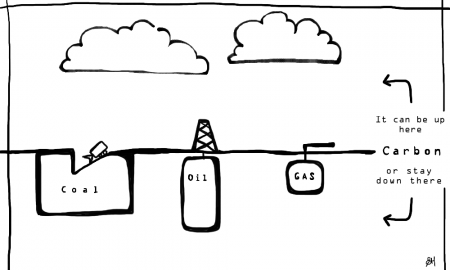Natural gas is mostly methane. When you burn methane in air, it produces carbon dioxide and water. Combine one molecule of methane (CH4) with two molecules of oxygen (O2) and you get one molecule of CO2 and two of water. The inescapable consequence of this is that when we burn natural gas and release the combustion products into the atmosphere, we warm the climate. The equation couldn’t be more simple.
The world as a whole is on track to blow right past the safe level of carbon dioxide in the atmosphere, and push things to the point where dangerous climate change will almost certainly happen. As a result, every new gas find is a blow to humanity as a whole.
Of course, it isn’t seen that way by the people who find the gas. Off the coast of Israel, the recently discovered Leviathan field may contain 453 billion cubic metres of climate-warming gas. Extracting and selling it will be profitable for the firms and governments involved, but it will probably be counterproductive for humanity as a whole. Whatever is gained today through the use of that energy will be lost in the future, when we need to deal with the consequences of the extra warming.
People sometimes celebrate the increased use of natural gas as a climate change solution, since you can get more electricity for each unit of climate change produced by burning natural gas than you can by burning coal. What this misses is how long it takes for any greenhouse gases we add to the atmosphere to come out. Every unit of fossil fuel we burn is a problem, and each new fossil fuel discovery risks pushing back the day when we move to safer forms of energy.
